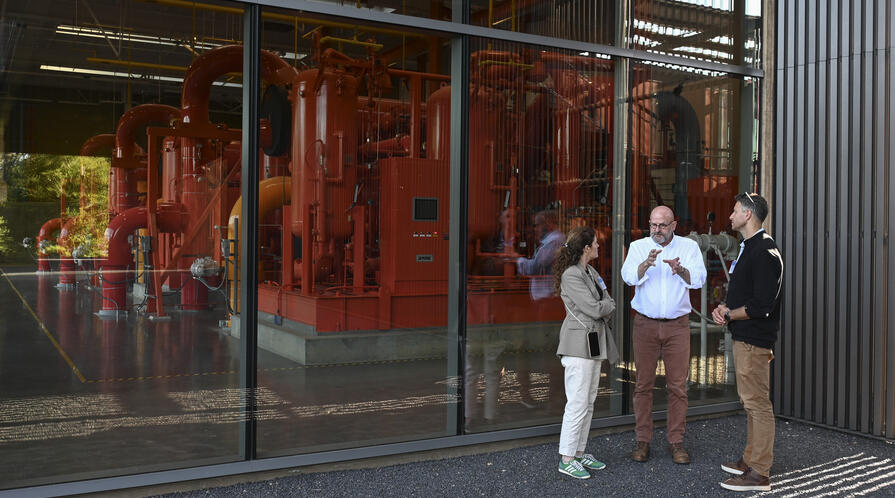“The pessimism that flows from our analysis, our observation, and our lived experiences can — must, and should be — overcome by the optimism of our thought, our action, our creativity, and our courage,” Naidoo said. “This is a moment for brutal honesty.”
He said that’s why his talk was titled “Creative Maladjustment,” a concept put forth by Dr. Martin Luther King, Jr., to link the internal struggles of individuals to the social forces around them. Naidoo said, “There are some things in our society and in our world that make me proud to be maladjusted.”
For example, he said it’s not wise or healthy to “adjust” oneself to racial segregation and discrimination, or economic conditions that take necessities from the underprivileged only to luxuriously benefit the wealthy. “If anybody thinks that COVID was the worst disease you lived through, I submit to you that the worst disease we face as humanity is a disease called ‘affluenza.’ Affluenza is a pathological illness where rich and poor alike have been led to believe that the most important thing to give you a decent meaning in life is more and more material acquisitions.”
Intersectionality, culture, creativity
Naidoo said that humanity needs to embrace the idea of ‘intersectionality,’ or recognizing that all these different social and environmental issues are interconnected. One can’t just focus on oneself without considering how everything is tangled up together, so we have to address challenges in more unified ways.
‘Cultural emergence’ — the process of letting diverse cultural perspectives and voices guide us in finding solutions — is another important concept, Naidoo said. Societies can benefit from listening to indigenous and ancient knowledge and understanding their traditional practices and wisdom. Such communities have been living in harmony with nature for centuries, and much can be learned from them, he said.
Another transformative concept is ‘artivism,’ or where arts and activism come together as social and cultural movements. Facts and figures (while critically necessary) are useful, but ultimately, people also need storytelling, music, and the visual arts to drive home the urgency of the environmental crisis and spur constructive action. “We need to reach people’s hearts and bodies as well as we do their heads,” he said.
He explained that people are overstimulated with the constant onslaught of information every day. So, art has the power to move and have lasting effects on cultures that get deeply entrenched, so long as this dynamic is used in positive ways.
New paths forward after conflicts
“We need to redesign much of the current system that we have, whether it be economics, whether it be energy or transportation. And so, the notion of creative maladjustment is a clarion call,” said Naidoo, who also referred to the military build-ups in the U.S. and elsewhere. “Sadly, we are spending even more money on military expenditures.”
He quoted President Dwight Eisenhower’s farewell address in 1961: “‘In the councils of government, we must guard against the acquisition of unwarranted influence, whether sought or unsought, by the military-industrial complex. The potential for the disastrous rise of misplaced power exists and will persist.’”
Naidoo spoke of lost or hijacked opportunities for true societal change after the fall of the Berlin Wall in 1989, the protests against the Iraq War in 2003, the economic crises of 2008-09, the Arab Spring movements in the early 2010s, and the emergence from the COVID global pandemic in 2020. “These were moments where we could have learned a lot.”
For instance, he said, in the post-COVID era, the conversations among those in power were about system recovery, system protection, and system maintenance when what was actually needed was system innovation, transformation, and redesign. He cited a 2002 RAND study commissioned by the CIA that concluded that the biggest threat to peace, security, and stability in the decades ahead will not come from terrorism or conventional threats but from the impacts of climate change.
“If you look at the Syrian war and some of the conflicts in Africa now, the hand of climate change is alive and well in many of those conflicts. Within this context, we have to recognize that we are dealing with a particular unique moment in history where we've seen a convergence of multiple crises,” Naidoo said.
‘Knowledge that resonates’
On messaging, a new approach needs to be considered, he said. “Sadly and somewhat ironically, it’s the likes of Steve Bannon and Donald Trump who appear to better understand this truth.” We don’t need to lie, Naidoo said, but we just need to communicate thoughtfully and impactfully and not send a barrage of communications exclusively rooted in science and jargon while ignoring the heart and human emotions.
“Our challenge is to center our narratives in a way that not only speaks to the head but also touches the heart. By blending the power of evidence with the art of storytelling, we can create profound impacts on individuals and communities. We must strive to communicate knowledge that resonates with people’s emotions, values, and aspirations,” Naidoo said.









![[Left to right]: Michael McFaul, Marshall Burke, Steven Pifer, Oriana Skylar Mastro, Didi Kuo, and Amichai Magen on stage.](https://fsi9-prod.s3.us-west-1.amazonaws.com/s3fs-public/styles/895x498/public/2024-10/fsi_reunion_2024_panel_hero.png?h=c4d9845d&itok=qQV3guUp)

















